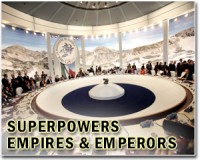| . |  |
. |
Washington (AFP) Nov 29, 2010 Whistleblower website WikiLeaks has unleashed a flood of US cables detailing shocking diplomatic episodes, from a nuclear standoff with Pakistan to Arab leaders urging a strike on Iran. The leaked memos describe a Chinese government bid to hack into Google; plans to reunite the Korean peninsula after the North's eventual collapse; Saudi Arabia's king's call to the US to bomb Iran to halt its nuclear drive. The confidential cables, most of which date from 2007 to February this year, also reveal how the State Department has ordered diplomats to spy on foreign officials and even to obtain their credit card and frequent flier numbers. The memos, released on Sunday, recount closed-door remarks such as Yemen's president telling a top US general: "We'll continue saying the bombs are ours, not yours" when discussing secretive US strikes on Al-Qaeda. A description of Libyan leader Moamer Kadhafi said he required the near-constant assistance of a "voluptuous blond" Ukrainian nurse. The Guardian newspaper reported that a classified directive sent to US diplomats under US Secretary of State Hillary Clinton's name in July 2009 sought technical details about the communications systems used by top UN officials. The directive also sought intelligence on UN Secretary General Ban Ki-moon's "management and decision-making style," said to the report. UN officials declined to comment. In another document, US Defense Secretary Robert Gates told his French counterpart that Israel could strike Iran without US military support but the operation might not be successful. The New York Times, Britain's The Guardian, Germany's Der Spiegel, France's Le Monde and Spain's El Pais published the first batch of the documents on Sunday, saying more would follow in the coming days. WikiLeaks chief Julian Assange described the release as a "diplomatic history of the United States" that would cover "every major issue." Despite coming under a cyber attack that took down its main website earlier in the day, WikiLeaks started publishing the 251,287 cables -- 15,652 of which are classified "secret" -- from 274 US embassies around the world on a sub-website http://cablegate.wikileaks.org. In an introduction, it painted the United States as a hypocritical superpower and attacked "the contradictions between the US's public persona and what it says behind closed doors." The White House hit back, saying the release was a "reckless and dangerous action" that put lives in danger. "To be clear -- such disclosures put at risk our diplomats, intelligence professionals, and people around the world who come to the United States for assistance in promoting democracy and open government," White House press secretary Robert Gibbs said in a statement. The Pentagon, already infuriated by the website's publication of secret Afghanistan and Iraq war logs earlier this year, unveiled new steps to prevent future leaks. US officials had raced to contain the diplomatic fallout by warning more than a dozen governments of the impending leaks, but Washington refused to negotiate with WikiLeaks, saying it had obtained the cables illegally. Assange has denied the release of the documents placed individuals at risk. "As far as we are aware, and as far as anyone has ever alleged in any credible manner whatsoever, no single individual has ever come to harm as a result of anything that we have ever published," he said Sunday. The New York Times explained its decision to publish the cables by saying they "serve an important public interest." The newspaper said it had "taken care to exclude... information that would endanger confidential informants or compromise national security". It had consulted White House officials on sensitive issues but reserved the final decision to itself, it said. The Guardian said all five papers had decided "neither to 'dump' the entire dataset into the public domain, nor to publish names that would endanger innocent individuals." None of the countries at the heart of the most explosive revelations had responded publicly to the leaks by late Sunday. But one Saudi government advisor told AFP: "The whole thing is very negative. "It's not good for confidence-building," he said on condition of anonymity. US officials have not confirmed the source of the leaks, but suspicion has fallen on Bradley Manning, a former army intelligence agent arrested after the release of a video showing air strikes that killed reporters in Iraq. WikiLeaks argues that the first two document dumps -- nearly 500,000 US military incident reports from 2004 to 2009 -- shed light on the wars in Afghanistan and Iraq. burs-jk/ao/mk/jj
Share This Article With Planet Earth
Related Links Learn about the Superpowers of the 21st Century at SpaceWar.com Learn about nuclear weapons doctrine and defense at SpaceWar.com
 Newspapers defend publishing WikiLeaks memos
Newspapers defend publishing WikiLeaks memosWashington (AFP) Nov 28, 2010 The New York Times, The Guardian and Le Monde on Sunday defended their decision to publish hundreds of secret US diplomatic memos obtained by WikiLeaks while voluntarily withholding certain information. The Times, in a note to readers, said it believes the documents "serve an important public interest, illuminating the goals, successes, compromises and frustrations of American diplomacy in a ... read more |
|
| The content herein, unless otherwise known to be public domain, are Copyright 1995-2010 - SpaceDaily. AFP and UPI Wire Stories are copyright Agence France-Presse and United Press International. ESA Portal Reports are copyright European Space Agency. All NASA sourced material is public domain. Additional copyrights may apply in whole or part to other bona fide parties. Advertising does not imply endorsement,agreement or approval of any opinions, statements or information provided by SpaceDaily on any Web page published or hosted by SpaceDaily. Privacy Statement |